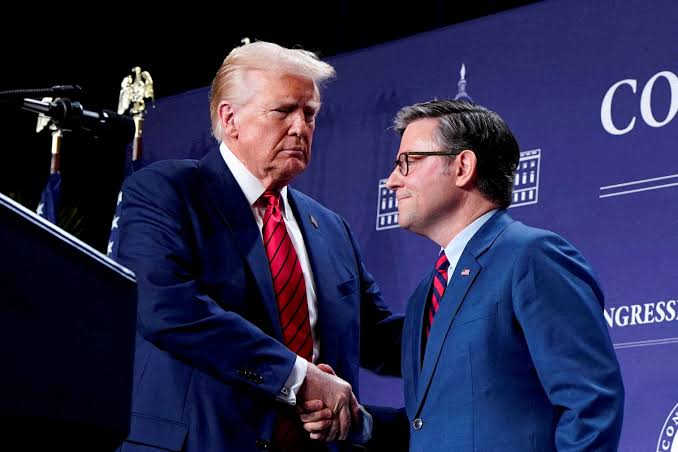The Republican-led U.S. Congress is poised to advance legislation this week aimed at maintaining government funding and preventing a partial shutdown set to begin on Saturday, amid President Donald Trump’s swift initiatives to reduce federal agency budgets.
Members of the divided House Republican majority, which holds a slim 218-214 edge and has frequently opposed Speaker Mike Johnson’s proposals over the past year, have indicated their backing for the bill. This legislation would sustain government funding at current levels until September 30, the conclusion of the fiscal year.
Johnson has announced plans for a procedural vote on the bill on Monday, with the goal of securing its passage by Tuesday. Proponents argue that the House must approve this measure to facilitate Trump’s agenda, which includes significant tax reductions and increased funding for immigration enforcement and military operations.
Trump has expressed his support for the proposed legislation.
Several Senate Democrats, who possess the ability to obstruct the bill due to the 60-vote requirement for overcoming a filibuster, have indicated their willingness to back it. They prefer to avoid further government instability, especially in light of the recent dismissal of over 100,000 federal employees by Trump adviser Elon Musk.
The proposed bill addresses discretionary spending, including essential services such as law enforcement and air traffic control, and constitutes approximately 25% of the federal budget, which totals around $6.75 trillion. This budget also encompasses expenditures for the Social Security retirement program and over $1 trillion annually in interest payments on the nation’s escalating $36 trillion debt.
See more: Vietnam Sentences Journalist to Prison for Criticizing Government Online.
The proposal would raise defense allocations by approximately $6 billion while cutting non-defense allocations by about $13 billion, as reported by aides to House Republican leaders. It would also maintain a freeze on $20 billion in funding for the tax-collecting Internal Revenue Service, which was previously included in a stopgap measure passed in December.
Lawmakers will encounter a more significant deadline later this year when they must deal with their self-imposed debt ceiling, or they could face a catastrophic default that would shake the global economy.
The most recent government shutdown lasted 35 days from late 2018 into early 2019 during Trump’s first term. Ongoing standoffs between lawmakers over government shutdowns and the debt ceiling have already impacted the credit rating of the U.S.
Two of the three leading international credit rating agencies have lowered the U.S. federal government’s previously premier rating.
HARDLINERS FALL IN LINE
Last year, members of the hardline conservative House Freedom Caucus consistently declined to vote on funding bills, especially the short-term funding extensions known as continuing resolutions that Congress plans to consider this week.
Trump’s endorsement of the proposal has shifted opinions, and several members expressed willingness to support the bill after a White House meeting last week.
The group’s chair, Representative Andy Harris from Maryland, indicated that supporting the measure was effectively backing Trump.
“I am completely in his corner,” Harris stated to reporters.
In the same vein, Representative Victoria Spartz, a conservative from Indiana who nearly obstructed the House from passing its budget outline for the Trump tax plan last month, expressed her backing.
“I don’t believe we have time for alternatives. I’m being realistic,” she told Reuters.
Trump responded to inquiries from reporters on Sunday, stating that while a shutdown is possible, he is hopeful that the bill will be approved.
“It could occur. It shouldn’t occur, and it likely won’t. I believe the CR will be passed. We shall see,” he noted, referring to a continuing resolution to maintain government funding.
Johnson will need the backing of his hardliner colleagues since Democratic Minority Leader Hakeem Jeffries stated that the Republican funding bill would breach a bipartisan spending agreement enacted into law in 2023. Several leading Senate Democrats have contended that its framework would provide Trump with additional authority to allocate funds at his discretion.
“If Republicans choose this path, as Speaker Johnson has suggested, they should expect to go it alone,” Jeffries remarked.
SENATE PREPARED
If the bill passes in the House, it will head to the Senate, where Republicans hold a 53-47 majority, requiring the support of at least seven Democrats for its passage.
Several Senate Democrats from varying ideological backgrounds indicated they anticipate supporting the measure.
Moderate Democratic Senator John Fetterman from Pennsylvania mentioned he would not dismiss the bill, stating, “That’s chaos. I will never endorse chaos.”
In a similar fashion, liberal Democratic Senator Ron Wyden from Oregon expressed his support, stating, “Shutdowns are not a good idea. I’m not in favor of shutdowns.”
Not everyone was in favor. Moderate Senator Elissa Slotkin, who delivered her party’s response to Trump’s address to Congress last week, conveyed little motivation to back the bill at a time when Trump and Musk’s austerity efforts disregard prior congressional directives regarding spending.
“Until I receive assurances that whatever we approve next week will ensure that funds are utilized as Congress intends… I am inclined to withhold my vote,” the Michigan Democrat said on NBC’s “Meet the Press” on Sunday.



